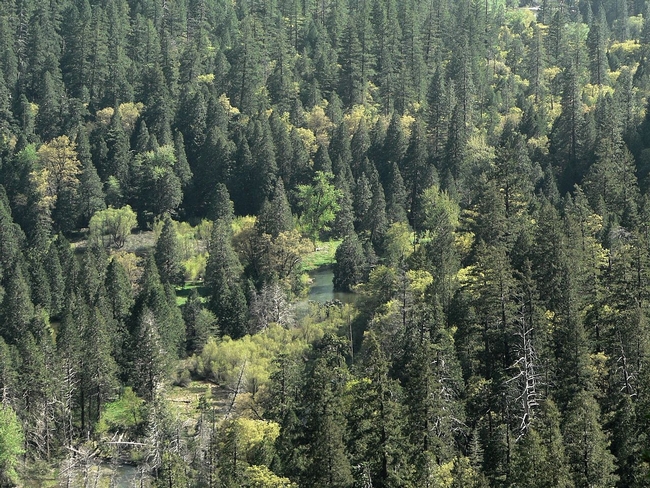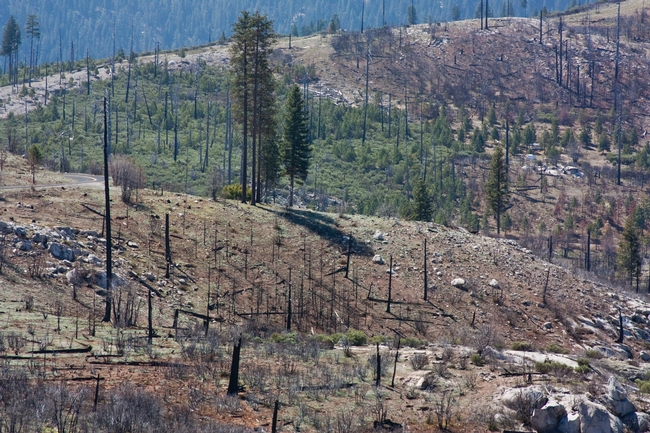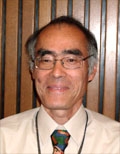Posts Tagged: forest
Fewer big trees found in today's forests
The story said scientists compared exquisitely detailed tree data collected in the 1920s and 1930s with tree surveys made between 2001 and 2010. They identified significant and rapid changes in basic forest structure. As large tree density fell across the state, and the density of small trees increased.
"The thing that I think is particularly worrisome is how widespread this is," said Maggi Kelley, UC Cooperative Extension specialist in the Department of Environmental Science, Policy and Management at UC Berkeley. "These changes will have an impact on how animals use the forest, how fire moves through the forest and the way we view the forest."
"Our grandkids will definitely see a difference," she said.
The Los Angeles Times also covered the new research, which will be published in the Proceedings of the National Academy of Sciences.
LA Times reporter Taylor Goldenstein spoke to study co-author Mark Schwartz, a professor of environmental science and policy at UC Davis and director of the John Muir Institute of the Environment. Schwartz said a denser forest allows fire to travel faster, causing more devastation. After a fire, new, smaller trees grow that are more likely to catch fire, and the cycle continues.
“These are historically fire-maintained ecosystems,” Schwartz said. “The firemen are faced with this notion of when a fire is reported and started, do they go out and bring out helicopters, trucks and people and put the fire out or do they let it burn?”
Just how much the change in forest structure is due to fire suppression and how much results from climate change is hard to tell because the two are interrelated, Schwartz said.
National Geographic magazine invoked Peter, Paul and Mary's mournful ballad in its headline, "Where have all the big trees gone? They've gone to logging and housing - but especially to climate change."
Reporter Warren Cornwall wrote that no area was immune to the forests' decline, from the foggy northern coast to the Sierra Nevada mountains to the San Gabriels above Los Angeles.
The loss of big trees was greatest in areas where trees had suffered the greatest water deficit. Large trees in general appear to be more vulnerable to a water shortfall. Though the 2011-14 drought might have an impact on forest change, it was not reflected in this study because the data was collected before the drought began.
UC researchers discuss oak health in LA
The goldspotted oak borer continues to threaten oak trees, Tom Scott, area natural resource specialist located at UC Riverside, told participants at conference on sustaining native oak woodlands in Los Angeles, the Monrovia Patch reported.
Scott said there is still a quarantine on moving firewood out of San Diego County to prevent the spread of the damaging insect.
Reporter Sandy Gillis wrote that Larry Costello, UC Cooperative Extension environmental horticulture advisor emeritus, described the power of oaks to access water deep in the soil.
UC adds 4,584 acres of forest to its research lands
The Los Angeles Times and San Francisco Chronicle reported on UC's acquisition of 4,584 acres of Northern California mixed-conifer forest as part of a PG&E bankruptcy settlement.
Debra Levi Holtz, who wrote the article for the Chronicle, quoted Keith Gilless, dean of the UC Berkeley College of Natural Resources, which houses the UC Center for Forestry, as saying, "For us, this is a dream come true to have a network of research sites on a north-south transection through the Sierra Nevada and Cascade ranges that will dramatically improve our capacity to do work on forest ecosystems that is responsive to the questions we all have about the impacts of climate change on those regions."
Solve economy, wildfires woes at same time
Forest restoration would be one way to improve our economy, writes researcher Tong Wu of the Center for Forestry and UC Berkeley on CNN's Global Public Square news website. He states that human interference has "made many ecosystems unnaturally susceptible to catastrophic wildfires" and that global warming will exacerbate the problem.
"In economic analyses of environmental management projects across the western United States, ecological restoration produced multiplier effects (the economic 'bang for the buck' of every dollar spent) that were higher than the estimated impacts of the 2009 government stimulus," he wrote.
UCCE forester's retirement to leave a big hole
When UC Cooperative Extension forestry specialist Gary Nakamura retires this summer, he will be "leaving a big hole in our local community," organic farmer Wayne Kessler told the Redding Record-Searchlight.
The article, written by Tim Holt, reviewed Nakamura's nearly 40-year career as a forestry expert, which included stints with private industry and the U.S. Forest Service, before his long-time tenure with UC Cooperative Extension.
Nakamura took on a unique role as a go-between, a soft-spoken and knowledgeable mediator between public and private interests, the article said. In the 1990s, he worked to bring together timber interests, the Forest Service, environmental groups and local communities to form the Shasta Tehama Bioregional Council.
With the council, Nakamura was able to help craft a compromise for understory fuels reduction that:
- Placated environmentalists' concerns with third-party monitoring
- Guaranteed that clearing efforts would be for wildfire suppression and not economic gain
The article said Nakamura is still pursuing collaborative forestry programs. He is now assembling private timber companies, environmental groups, ranchers and public agencies in the Burney Creek/Hat Creek watershed. The effort, involving 340,000 acres of publicly and privately owned lands, will shore up creek banks, restore wetlands, add trails, and "create and maintain a local resource-based economy by encouraging more thinning and biomass harvesting for fuels," Nakamura told the reporter.
"We're fortunate to have highly productive forests in California. My whole career has been about conserving them, and using them wisely," the article quoted Nakamura.
New funding to study wheat and forest genetics
Roger Beachy, the director of the USDA National Institute of Food and Agriculture, was at UC Davis yesterday to announce grants for agricultural research amounting to $40 million, calling them "significant investments," said a UC Davis news release.
Together with UC Davis officials, Beachy announced that:
- Wheat geneticist Jorge Dubcovsky will receive $25 million to develop new varieties of wheat and barley. Dubcovsky and his 55 university and USDA colleagues will focus on biological and environmental stresses to wheat that are caused, at least in part, by global climate change.
- Forest geneticist David Neale will receive $14.6 million to head a team that will work to sequence the genomes of loblolly pine and two other conifers. Neale and his research colleagues plan to accelerate breeding efforts for fast-growing varieties of these trees to enhance their use as feedstocks for biofuels and biopower.
"We look forward to the practical solutions for agriculture and for the environment that will arise from these collaborative projects," UC Davis Chancellor Linda Katehi said at the press conference.
A story about the grants written by Rick Daysog of the Sacramento Bee said they come as UC Davis has stepped up efforts to attract research grants following Katehi's appointment as chancellor in 2009. During its fiscal year ending June 30, 2010, the university received a record $679 million in research grants.

Left to right: David Neale, Jorge Dubcovsky, Linda Katehi, Roger Beachy, Neal Van Alfen.



